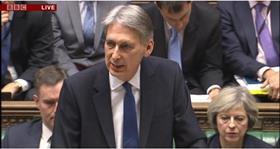
The food industry has given a lukewarm reception to the Chancellor’s autumn budget, pointing out it does little to ease the current pressure over Brexit.
In his announcement at Westminster, Chancellor Philip Hammond outlined a range of measures, including the fact that the VAT threshold for small businesses will remain at £85,000 for two years, scapping fuel duty rises for petrol and diesel cars scheduled for April 2018, and allocating a further £2.3 billion for investment in research and development.
As expected, the National Living Wage will rise by 4.4 per cent in April 2018, from £7.50 an hour to £7.83.
But the Budget did not receive a rapturous reception at the NFU, which called on all government departments to prioritise the need for the nation’s ability to produce food and care for the countryside.
President Meurig Raymond said: “We are disappointed to see no meaningful measures to help prepare farming businesses for life outside the EU in today’s Budget statement. With most of the emphasis on urban growth, there is little in the way of measures to benefit rural communities.
“We do, however, appreciate that this is a fairly stable Budget that does not appear to have any adverse impact on our industry.
“In these times of uncertainty, and ahead of significant upheaval, we need to have sustainable and viable businesses producing the nation’s food. Our calls to create the right environment for investing in farming, to mitigate risks, are yet to be answered.”
Food & Drink Federation director general Ian Wright welcomed the focus on investment in skills, infrastructure and R&D in the Budget. “If we are to unlock the productivity potential within UK food and drink manufacturing then boosting skills, innovation and exports will be critical,” he said. “We hope to see an acknowledgement of the progress of our work to support these priorities in next week’s Industrial Strategy White Paper.”



